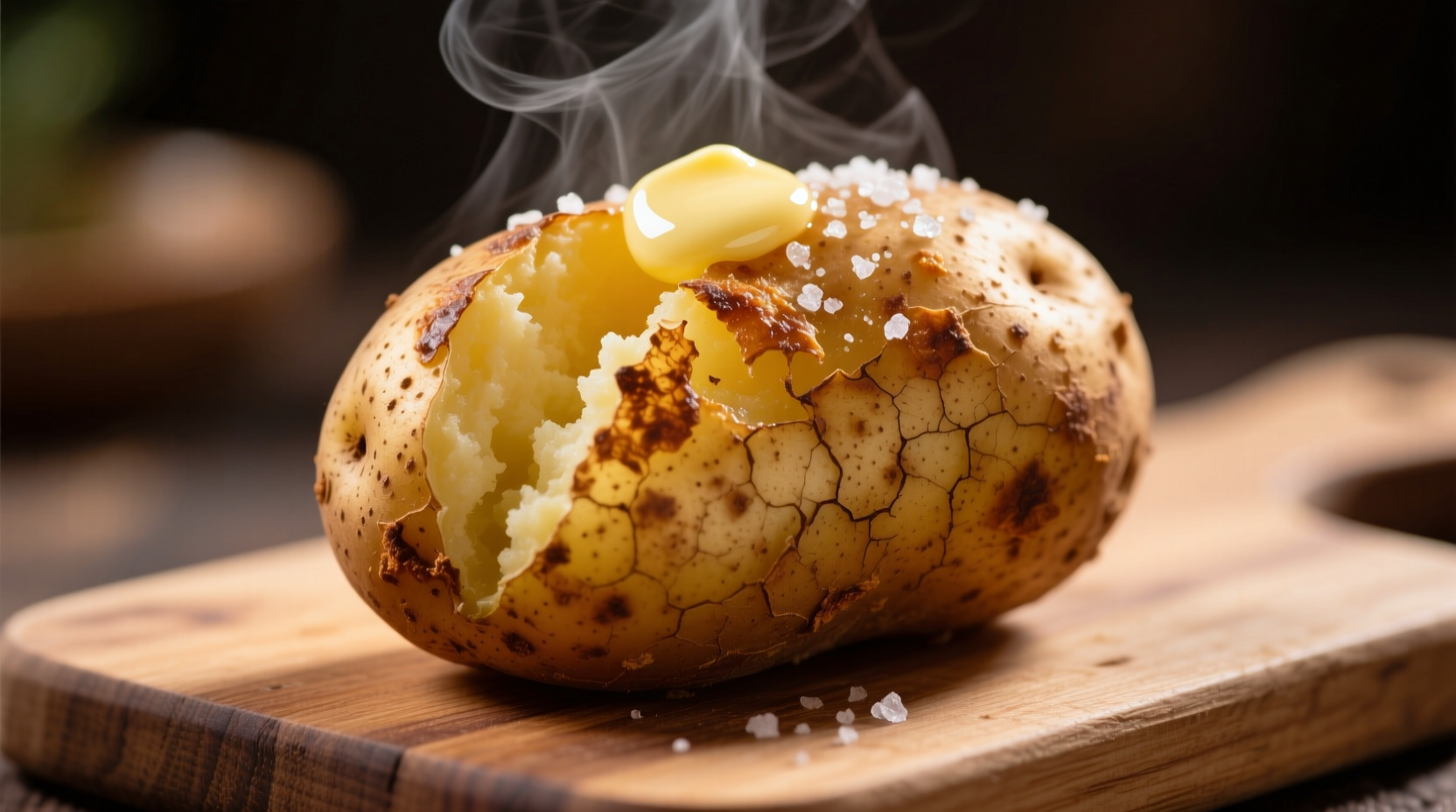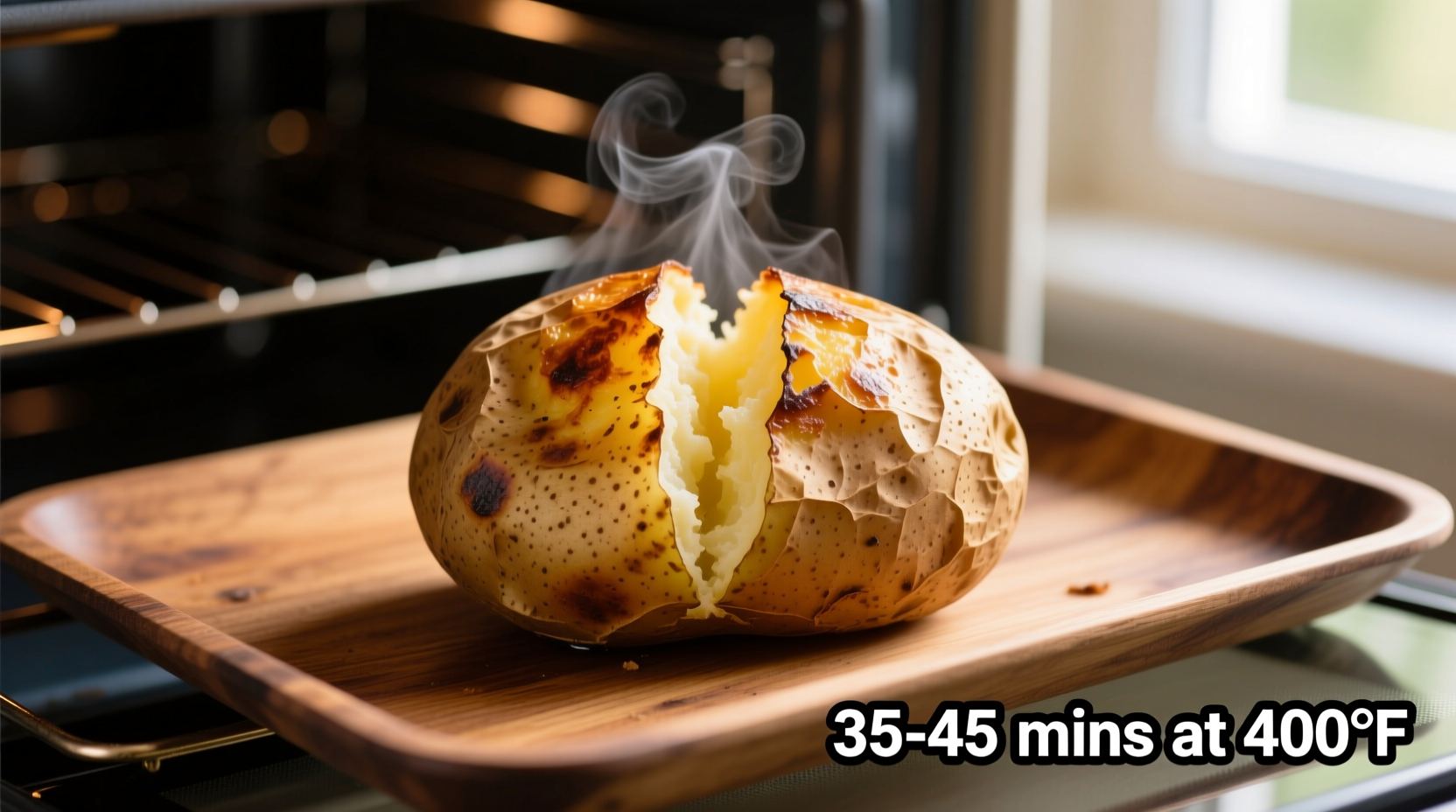The Perfect Baked Potato: Timing Made Simple
Nothing beats a perfectly baked potato with crispy skin and fluffy interior. But getting the timing right can be tricky. Whether you're cooking one potato for a weeknight dinner or a dozen for a holiday feast, understanding the variables that affect baking time ensures consistent results every time.
Why Timing Varies: Key Factors You Need to Know
The "how long" question has no single answer because multiple factors influence baking time. Understanding these variables puts you in control of the cooking process:
- Potato size - Larger potatoes need significantly more time
- Oven temperature - 400°F is ideal for balance of cooking time and texture
- Starting temperature - Cold potatoes from the fridge need extra minutes
- Rack position - Middle rack provides most even heat distribution
- Poking holes - Essential for steam release to prevent bursting
| Potato Size | Weight | 400°F Baking Time | Internal Temp |
|---|---|---|---|
| Small | 4-6 oz | 45-55 minutes | 205-210°F |
| Medium | 6-8 oz | 55-65 minutes | 205-210°F |
| Large | 8-10+ oz | 65-75 minutes | 205-210°F |
Step-by-Step Baking Process
Preparation: Setting Up for Success
Proper preparation prevents common problems like bursting or uneven cooking. Start by thoroughly washing potatoes under cold water to remove dirt. Use a fork to pierce each potato 6-8 times around the surface - this allows steam to escape during baking. For crispier skin, rub potatoes lightly with olive oil and sprinkle with coarse salt before baking.
Baking: The Critical Time Window
Place potatoes directly on the middle oven rack with a baking sheet on the lower rack to catch any drips. At 400°F, begin checking potatoes at the minimum time shown in the table. The USDA Food Safety and Inspection Service confirms that properly cooked potatoes should reach an internal temperature of 205-210°F for optimal texture and safety (USDA FSIS).
Checking Doneness: Beyond Just Timing
Timing guidelines are helpful starting points, but visual and tactile cues provide the most reliable doneness indicators. Insert a fork into the thickest part - it should slide in with no resistance. Gently squeeze (using oven mitts!) - properly cooked potatoes yield slightly under pressure. For absolute certainty, insert an instant-read thermometer into the center; it should read 205-210°F.

Common Mistakes That Affect Baking Time
Avoid these frequent errors that lead to undercooked or overcooked potatoes:
- Not preheating the oven - Always wait for full preheat before baking
- Wrapping in foil - Creates steamed potatoes rather than baked (adds 15-20 minutes)
- Crowding on baking sheet - Prevents proper air circulation
- Opening oven frequently - Each opening drops temperature significantly
- Ignoring altitude - At high elevations, add 5-10 minutes to baking time
Advanced Timing Adjustments
Professional kitchens use these techniques to control baking time precisely:
For faster cooking: Microwave potatoes for 3-5 minutes before finishing in the oven. This reduces oven time by about 25% while maintaining texture. For crisper skin: Increase oven temperature to 425°F and reduce baking time by 5-10 minutes. For meal prep: Bake potatoes fully, then store in the refrigerator for up to 5 days before reheating.
According to America's Test Kitchen research, the critical window between perfectly cooked and overcooked potatoes is just 8-10 minutes. This narrow margin makes checking early crucial for consistent results.
Serving and Storage Tips
Once your potatoes reach the ideal internal temperature, remove them immediately. Let them rest for 5 minutes before cutting to allow steam to redistribute. For restaurant-quality presentation, slice open and fluff the interior with a fork before adding toppings.
Store leftovers in an airtight container in the refrigerator for up to 5 days. When reheating, the oven or toaster oven preserves texture better than the microwave. For food safety, never leave cooked potatoes at room temperature for more than 2 hours.
Troubleshooting Common Issues
Undercooked potatoes: Return to oven and check every 5 minutes. If time is critical, microwave for 1-2 minutes to finish cooking.
Overcooked/dry potatoes: Next time, reduce baking time by 5-10 minutes. For current batch, add extra moisture with melted butter or sour cream.
Bursting potatoes: Always pierce thoroughly before baking. If bursting occurs, it's usually due to insufficient venting or uneven heating.
Frequently Asked Questions
How do I know when a baked potato is done without a thermometer?
The fork test is most reliable - insert a fork into the thickest part. If it slides in with no resistance, the potato is done. You can also gently squeeze (using oven mitts) - properly cooked potatoes yield slightly under pressure. The skin should appear slightly wrinkled, and the potato should feel light for its size.
Can I bake potatoes at a lower temperature for longer?
Yes, but with texture trade-offs. At 350°F, baking time increases to 75-90 minutes for medium potatoes. The lower temperature creates moister interior but less crispy skin. For best results, don't go below 375°F, as temperatures below this risk creating a gummy texture in the potato's center.
Why does my baked potato take longer than the recommended time?
Several factors can extend baking time: starting with cold potatoes from the refrigerator, using a convection oven without adjusting time, baking multiple potatoes at once, or having an oven that runs cooler than indicated. Always verify doneness with a thermometer rather than relying solely on timing.
Should I wrap potatoes in foil before baking?
No, wrapping in foil creates steamed potatoes rather than baked ones. Foil traps moisture, resulting in soggy skin and less fluffy interior. For crispy skin and fluffy texture, bake potatoes directly on the oven rack without foil. If you must use foil for cleanup, loosely tent it over the potatoes rather than wrapping tightly.
How long do baked potatoes stay hot after removing from oven?
Baked potatoes stay hot for about 30-45 minutes when left undisturbed. To keep them hot longer, place them in a cooler or wrap loosely in clean kitchen towels. Avoid sealing in airtight containers while still hot, as this creates condensation that makes skin soggy. For food safety, don't keep hot potatoes above 140°F for more than 2 hours.











 浙公网安备
33010002000092号
浙公网安备
33010002000092号 浙B2-20120091-4
浙B2-20120091-4